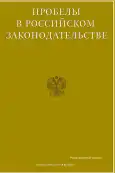To the Question of the Limits of Restrictions on the Rights and Freedoms of Foreign Citizens and Stateless Persons in Russia in Modern Conditions
- Authors: Akkaeva H.A.1
-
Affiliations:
- Krasnodar University of the Ministry of Internal Affairs of Russia
- Issue: Vol 16, No 4 (2023)
- Pages: 357-362
- Section: Current problems of the civil society development and the participation of its institutions in providing public security
- URL: https://journal-vniispk.ru/2072-3164/article/view/250413
- ID: 250413
Cite item
Abstract
Conducting a theoretical and legal analysis of the limits of restrictions on the rights and freedoms of a special category of individuals - foreign citizens and stateless persons in modern realities, due to global globalization processes, migration crises and geopolitical conflicts - this is the purpose of this work.
The rights and obligations of foreign citizens and stateless persons are generally similar to citizens of the host country. At the same time, at the level of individual states, exceptions are established in the form of restrictions on individual rights and freedoms, the limits of which are regulated in the Basic Laws of the states. Restrictions on the rights and freedoms of these subjects is a dynamic phenomenon, and within the framework of their legislative consolidation, it is mandatory to fully take into account the existing social and legal realities.
This circumstance determines the expediency of a theoretical and legal study of the limits of restrictions on the rights and freedoms of foreign citizens and stateless persons, which can become a guideline for legislators and law enforcers in terms of fixing the permissible behavior of this category of individuals.
The author substantiates that the purposefulness of the relevant restrictive impact on the behavior of foreign citizens and stateless persons is carried out by establishing specific limits formulated in the form of constitutional principles. It is noted that the legislative form of regulation of restrictions on human rights and freedoms is mandatory.
Full Text
##article.viewOnOriginalSite##About the authors
Halimat A. Akkaeva
Krasnodar University of the Ministry of Internal Affairs of Russia
Author for correspondence.
Email: Lel4993@mail.ru
Cand.Sci.(Law), Associate Professor, Police Colonel, Head of the department of special technical disciplines, North Caucasus Institute for Advanced Studies (branch)
Russian Federation, Nalchik, KBRReferences
- Bitunov A.G. Limits of restrictions on the rights and freedoms of persons with dual citizenship and other categories of foreign citizens // Science and Education: Problems and Development Strategies. 2018. No. 1 (4).
- Zorkin V.D. The essence of law // Questions of Philosophy. 2018. No. 1.
- Grechkina O.V., Shmaliy O.V. Features of the introduction of restrictive measures in emergency situations // Gaps in Russian legislation. 2021. Vol. 14. No. 6.
- Lukichev Yu.V. On the issue of equality of rights and obligations of foreign citizens, stateless persons with the rights and obligations of citizens of the Russian Federation // Actual problems of legislative regulation of migration processes in the territory of the CIS member states. St. Petersburg, 2018.
- Makovetskaya M.G. Limits of restrictions on the rights and freedoms of foreign citizens in Russia: dis. ... cand. legal Sciences. M., 2015.
- Poberezhnaya I.A., Nechipas Yu.V. Regimes of foreign citizens // Bulletin of the Institute of World Civilizations. 2019. V. 10. No. 3 (24).
- Rubanova M.E. Constitutional and legal restrictions on the political rights of foreign citizens in the Russian Federation // Legal Policy and Legal Life. 2017. No. 1.
- Urtaev A.K. Characteristics of special limits of restrictions on the rights and freedoms of foreign citizens // Actual Problems of Law: Sat. scientific Art. / ed. B.G. Koibaeva. Vladikavkaz, 2022.
- Channov S.E. Restriction of admission to the state and municipal service of persons with a criminal past // Legitimacy. 2010. No. 1.
- Shelegov Yu.V., Shelegov V.G. On the restriction of constitutional rights and freedoms of man and citizen in the Russian Federation // Gaps in Russian legislation. 2020. Vol. 13. No. 4.
Supplementary files








